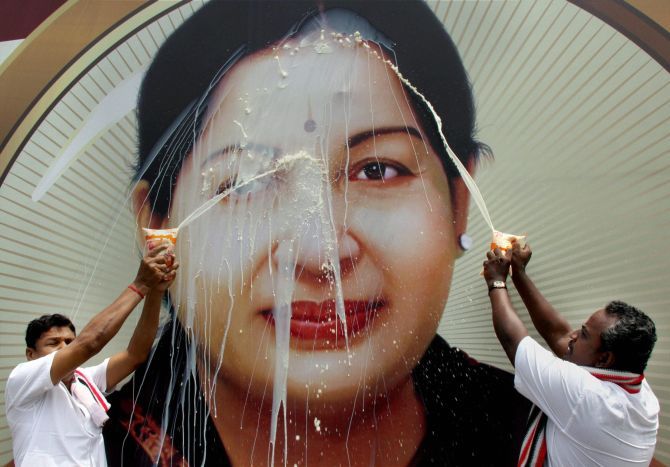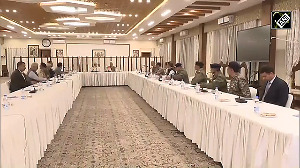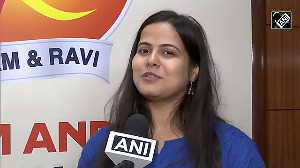
Even as an enthused AIADMK cadre celebrate their Amma’s return, if the Supreme Court stays the Karnataka high court judgment in the disproportionate assets case, Jayalalithaa may once again lose her chief ministership. R Ramasubramanian reports from Chennai.
Jayalalithaa Jayaram, 67, on Saturday took over as the chief minister of Tamil Nadu for a fifth time. At a glittering function in the spacious Madras University centenary auditorium in Chennai at 11 am, Governor K Rosaiah administered the oath of office and secrecy to Jayalalithaa. Along with Jayalalithaa, 28 other ministers were also sworn in.
Two ministers, who were part of (former chief minister) O Panneerselvam’s cabinet, Senthur Panidian and M S Anandan, were dropped. While Senthur Pandian was dropped because of his long hospitalisation, the reason for Anandan’s sacking was not known.
The entire function lasted just 30 minutes. In a departure from the age-old practice of each minister individually taking oath, the ministers took oath together in two batches. This unusual way of swearing-in has further fuelled speculations about Jayalalithaa’s health. Senior bureaucrats were silent about this departure from the usual practice.
Bharatiya Janata Party leader and Union minister from Tamil Nadu Pon Radhakrishnan, actor Rajinikanth, International Cricket Council chief N Srinivasan and several film-stars attended the swearing-in. However, no one from the Opposition was seen. It's still unclear whether they were extended invitations or chose to boycott it.
Jayalalithaa has earned the dubious distinction of being the only chief minister in the country who has been sworn-in five times and has lost the post twice.
She first lost her chief ministership on September 21, 2001, when a five-judge Constitution bench of the Supreme Court declared her holding office constitutionally null and void because of her conviction in the Tansi land deal. She did not contest the assembly elections in 2011 but still took charge as CM, which was challenged by the Dravida Munnetra Kazhagam in the apex court. The court ruled that a person who was disqualified to contest an assembly election cannot become chief minister.
But Jayalalithaa won her appeal in the Madras high court, contested the by-election, and subsequently became chief minister again in March 2012.
In the second case, Jayalalithaa was convicted and sentenced to four years imprisonment by Special Judge Michael John D Cunha on September 27, 2014, in a disproportionate assets case. However, Justice C R Kumarasamy of the Karnataka high court acquitted her and three others on May 11, which paved way for her return as chief minister of the state.
But the judgment has raised several questions with the Karnataka Special Public Prosecutor BV Acharya (the Supreme Court had ruled that Karnataka is the prosecuting agency in this case and not Tamil Nadu as the case had been shifted from TN to Bangalore in November 2003), BJP's Dr Subramanian Swamy and the DMK all claiming that there are huge mathematical errors in the judgment. Acharya and the advocate general of the state have recommended to the Karnataka government that the case is fit for an appeal in the Supreme Court. But the Karnataka government has not taken any decision so far and simply maintains they will look into all aspects of the judgment before taking a decision.

Several legal experts have expressed their reservations about the judgment that exonerated Jayalalithaa and three others in the more than 18-year-old case.
Dr Subramanian Swamy has said, 'There is no bar for Jayalalithaa from becoming a chief minister again, but if the Supreme Court stays the Karnataka high court judgment then she must immediately step down from office and that is not new for Jayalalithaa because she is used to that'.
Many feel the proverbial sword of Damocles still hangs over Jayalaithaa’s head due to the many discrepancies in the high court order exonerating her. Anti-corruption crusaders in the state and a few top retired bureaucrats who are associated with the case claim the judgment will not go unchallenged.
“This judgment says a public servant can amass wealth up to 10 per cent of his known sources of income. Justice Kumarasamy did not say that Jayalalithaa and three others did not indulge in corruption, but simply said that the amassed wealth is just 8.12 per cent more than their known sources of income. But that comes to about Rs 3 crore. If courts in India start acquitting those who were charged in corruption cases by citing this judgment then it will open the flood gates. The Supreme Court simply cannot allow this to happen. We are mobilising public opinion and will go to the Supreme Court. So many people are working in this direction,” a retired senior IAS officer told Rediff.com.
Even if the Karnataka government does not appeal, the original complainant in the case Dr Subramanian Swamy and the DMK will go in for an appeal. There are other prominent organisations and individuals who are also planning to appeal in this case.
On the other hand, there is hope and expectation in the state machinery that Jayalalithaa’s return will fine-tune the administration that has been paralysed after her conviction eight months ago. There are several schemes waiting for her return. The inauguration of the metro rail, induction of over 500 buses to the state transport corporation, global investor meets scheduled for September, are some of the things waiting in the pipeline.
For the AIADMK cadre this is festival time. They have waited restlessly for the past eight months. Thousands of them descended on the streets of Chennai to witness Amma taking charge.
Over 250 AIADMK cadres have committed suicide in the past eight months, unable to withstand the sorrow of their leader being jailed and disqualified. Jayalalithaa had distributed Rs 3 lakh to the families of each of those who ended their lives.
With the legal battle not yet over, Jayalalithaa has returned to office with a lot of challenges. It’s not clear what her priorities are going to be because more than the administrative or economic problems, the biggest problem looming large is the legal one. With just a year left for the state assembly elections, the ruling party has to pull up its socks to plug the loopholes. But unless their leader is cleared by the Supreme Court things are not going to be easy.
Jayalalithaa has won the battle, but whether she will win the war is the million dollar question. For the opposition, the war has just begun.







 © 2025
© 2025